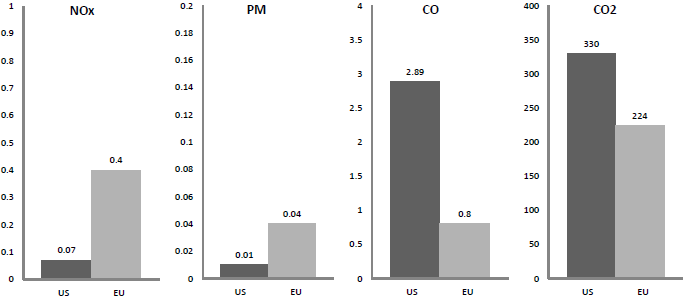How did the automobile market go from “diesel is stinky, noisy and slow” to “diesels are fun and clean” with turbocharged diesels selling like hotcakes in Europe to the Dieselgate scandal? Some economics researchers studied this question![]() , and found it had to do with opposing goals for emissions control laws in Europe and the U.S. The turbocharged diesels were designed for European emissions control laws, but didn’t do so well against America’s.
, and found it had to do with opposing goals for emissions control laws in Europe and the U.S. The turbocharged diesels were designed for European emissions control laws, but didn’t do so well against America’s.
The researchers note that it wasn’t until the introduction of TDI Diesel engines, in 1989, that diesel car sales took off. Within a decade the diesel car marketshare in Europe went from 10% to over 50%.
It’s commonly assumed the cause for this was the tax rate on diesel fuel. In order to “harmonize” energy taxation across Europe (I believe they mean the European Union), diesel fuel received favorable taxation with the European Fuel Tax Directive of 1973. However, that taxation treatment left the marketshare at 10%.
US, EU, Different air pollution standards
The picture at the top of this post shows the status of emission control standards in the U.S. and Europe. Note that US standards are strict on Nitrogen Oxides (NOx) and Particulate Matter (PM), while the EU is strict on Carbon Dioxide (CO2) and Carbon Monoxide (CO). In other words, European regulators are focused on fuel efficiency to limit the dependency on crude oil from Russia and the Middle East, and on greenhouse gas emissions to combat climate change. On the other hand, American regulators are focused on smog and health impacts of air pollution.
The 1990 amendments to the Clean Air Act focused on vehicle emissions connected with acid rain and smog. Remember when those were the hot button issues in America? Climate change is the issue today, but 20+ years ago we American’s had a different worry.
According to the study: “Three-way catalytic converters used to reduce emission in gasoline engines cannot cope with the high concentrations of NOx generated by diesel engines.” That caused both VW and Mercedes-Benz to stop selling diesels in America, for awhile. But because European air pollution standards focused on other pollutants, they were free to sell diesels in Europe, where the cars did very well.
Adding a urea tank and injection system is the method used by most automakers to mitigate NOx emissions from diesel vehicles. It’s thought that Volkswagen didn’t want the cost of that system, to hit lower price targets. Therefore VW’s cars did not have a urea system, and instead VW claimed to have solved their NOx emissions through some other mechanism. What we now know is that other mechanism was to lie and cheat the system.
But it gave VW several years of strong sales of TDI Diesels in America.
- The USA should delete Musk from power, Instead of deleting whole agencies as he demands - February 14, 2025
- Elon Musk, fiduciary duties, his six companies PLUS his political activities - February 10, 2025
- Is there enough Grid Capacity for Hydrogen Fuel Cell or Battery Electric cars? - April 23, 2023
- Is Tesla finagling to grab federal NEVI dollars for Supercharger network? - November 15, 2022
- Tesla announces the North American Charging Standard charging connector - November 11, 2022
- Lightning Motorcycles adopts Silicon battery, 5 minute charge time gives 135 miles range - November 9, 2022
- Tesla Autopilot under US Dept of Transportation scrutiny - June 13, 2022
- Spectacular CNG bus fire misrepresented as EV bus fire - April 21, 2022
- Moldova, Ukraine, Georgia, Russia, and the European Energy Crisis - December 21, 2021
- Li-Bridge leading the USA across lithium battery chasm - October 29, 2021

















Reportedly, the VW cars had an SCR only on models sold after 2012.
http://www.guillaumedarding.fr/affaire-volkswagen-qui-est-concerne-9907760.html#commentaires
Look forward an expensive SCR retrofit for models sold between 2008 and 2012.
Pingback: Greener in Europe? Four reasons the EU can't be trusted on the environment - StuntFM 97.3